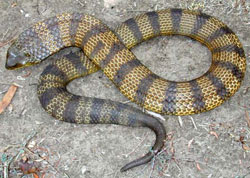
Clean up in time for snake season
The Department of Environment and Natural Resources (DENR) is reminding people to clean up their properties before snakes emerge during warmer weather.
DENR Manager Animal Welfare Dr Deb Kelly says when snakes are inactive during winter, their metabolism slows down and they lie dormant using almost no energy. They emerge in early spring and bask in the sun to warm up.
 “Snakes will become more active and less wary of people as they go about feeding to build up their body reserves after winter, and commence breeding,†she said.
“Snakes will become more active and less wary of people as they go about feeding to build up their body reserves after winter, and commence breeding,†she said.
In South Australia, the most common venomous snakes encountered in residential areas are the eastern brown snake, red-bellied black snake, the copperhead snake, the western brown snake and the tiger snake.
Snakes are protected by law under the National Parks and Wildlife Act 1972 and are an important part of the natural environment. They reduce populations of some of their prey species and prevent overpopulation of animals such as the introduced rat and mouse.
Some snake species, such as the eastern brown snake, seem well-adapted to co-exist with humans, and in urban environments their diet consists of primarily introduced species like rats and mice.
Like any other animal, snakes require food, water and shelter – so to prevent the incidence of snakes on your property, it is important to limit the availability of these resources, particularly the snake’s main food source – rats and mice.
“The brown snake shelters in wood heaps, under corrugated roofing iron and in piles of rubbish, all of which are often found in close proximity to houses in regional and metropolitan areas,†Dr Kelly said.
“And these snakes are not confined to regional areas; properties in metropolitan areas of Adelaide can provide good snake habitat.â€
Preventative measures to reduce the incidence of snakes on your property:
Manage the food source – take steps to reduce rats and mice, store bird seed and chook feed in sealed containers. People should avoid using bait to control rats or mice. If necessary, ensure baits are secure from pets and wildlife.
Remove or reduce cover (hiding areas)
- Keep the grass low
- Keep your garden tidy
- Keep wood heaps away from the house
- Keep a tidy shed
Media contact
Department of Environment and Natural Resources
Haley Cahalan
Media Adviser Department of Environment and Natural Resources
Phone (08) 8463 7437
Mobile 0423 827 613
www.environment.sa.gov.au
Tell your friends you found this at murrayriver.com.au!
Copyright Discover Murray 2024. This site or any portion of this site must not be reproduced, duplicated, copied, sold, resold, or otherwise exploited for any commercial purpose that is not expressly permitted by DISCOVER MURRAY.






 A Celtic Christmas by A Taste Of Ireland
A Celtic Christmas by A Taste Of Ireland DREAMS FLEETWOOD MAC & STEVIE NICKS SHOW
DREAMS FLEETWOOD MAC & STEVIE NICKS SHOW The Royal Edinburgh Military Tattoo 2023 - Arts On Screen
The Royal Edinburgh Military Tattoo 2023 - Arts On Screen Angove Family Winemakers Art Exhibition featuring Wendy Neal
Angove Family Winemakers Art Exhibition featuring Wendy Neal